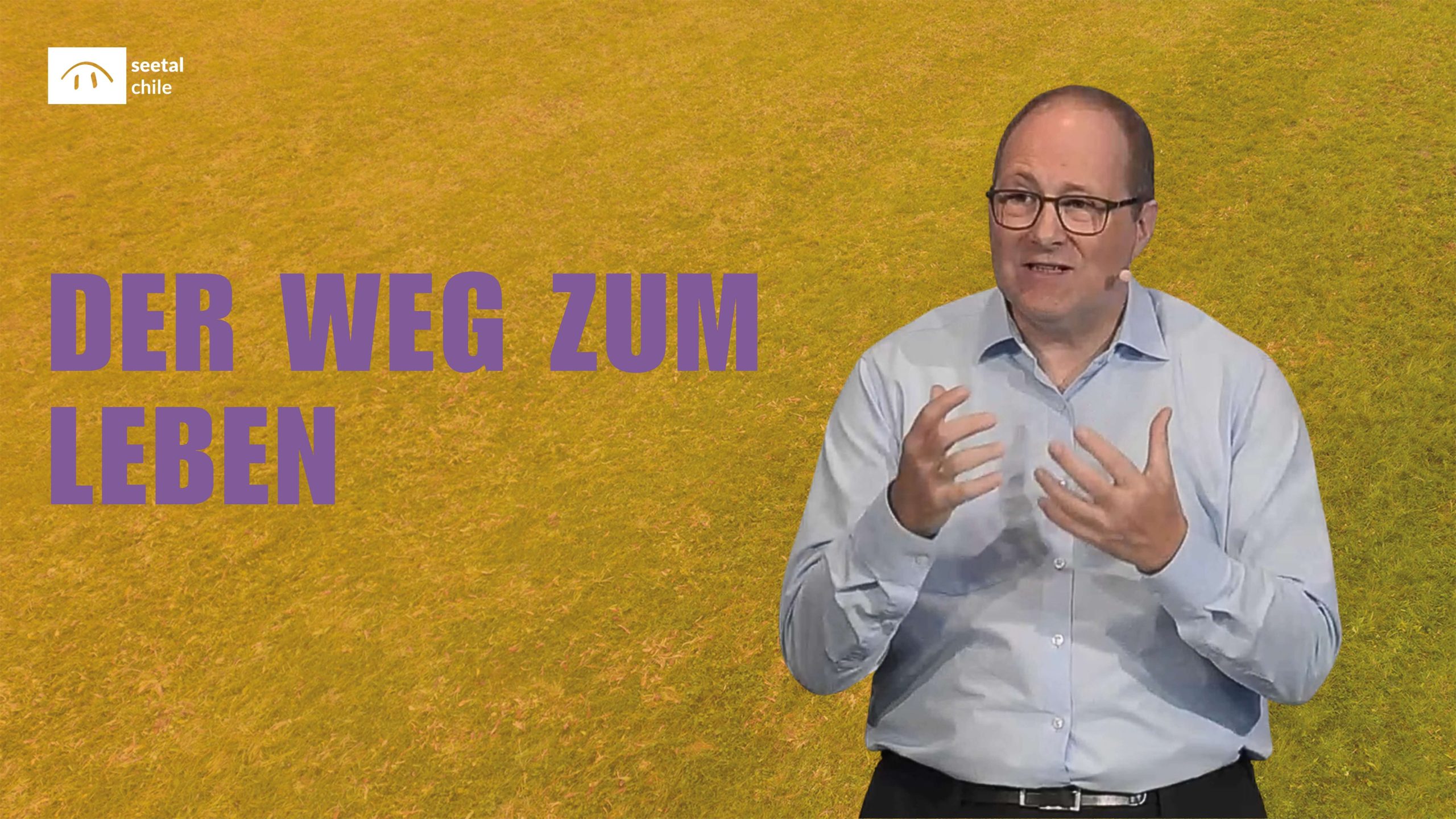Words & Faith | God speaks – and it will be
Series: EIFACH muetig – with Jesus as a role model | Bible text: Psalm 33:9; Matthew 8:19; John 1:1.14
In a world full of empty words, God’s word remains uniquely effective: When he speaks, it happens. Even at creation, two Hebrew words were enough to call the light into existence. This word also works today – it sustains the world, creates something new in the heart and brings healing, as with the centurion who trusted in Jesus» word. In Jesus Christ, God’s word has become human – visible, approachable, saving. The central message is: «God speaks – and it will» – then as now.
Words are experiencing a veritable inflation and thus a strong devaluation. Who knows whether the words spoken by a statesman are true or pure opportunism. If an athlete is convicted of doping, he denies it or looks for cheap excuses. Rarely is an offender convicted whose words match the evidence. Many words are spoken, but they are usually not trustworthy. It is completely different with God, the creator of the world: «For when he speaks, it is done; when he commands, it is written» (Psalm 33:9 LUT). His words are not empty or ineffective. They are powerful, creative, healing, comforting, awakening.
Creative words
The first chapter of the Bible bears witness to how God speaks His word into the chaos and thus calls the whole of creation into existence. For example, it says: «And God said: Let there be light! And there was light» (Genesis 1:3 LUT). Incredible. With just two Hebrew words – a verb and a noun (jehi or) – God spoke, and the light came on as if someone had flicked the switch of the universe. It contains between 100 and 400 billion stars in our galaxy alone, the Milky Way. It is estimated that there are another 100 billion to 2 trillion galaxies. Astrophysicists assume that there are more stars in the universe than grains of sand. Two words – and all the stars lit up without blowing a fuse.
God has not only created this world through his word, but he also carries it: «He is the reflection of his glory and the image of his being, and upholds all things with his powerful word, and has accomplished the purification of sins, and has sat down at the right hand of the Majesty on high» (Hebrews 1:3 LUT). If God were to withdraw his word, the whole of creation would instantly dissolve into nothingness. In addition to establishing and maintaining creation, Jesus created the prerequisite for man to be able to enter into contact with this Creator God by cleansing him of his sins.
The Hebrew word for the creation of the world out of nothing is bara. The same word is used by songwriter David: «Create (bara) in me, God, a clean heart and give me a new and steadfast spirit» (Psalm 51:12 LUT). God’s word not only works in the macrocosm, but also in the microcosm of our hearts. Here too, a new creature is created out of nothing by his grace (cf. 2 Corinthians 5:17). The ratio of God’s and man’s contributions is 100:0, God everything, man nothing. God can also create new things in your life and mine. Even if we say: «There is nothing more», God can speak – and new light, new meaning, new hope arises.
God’s word has an effect. It is like rain that brings forth life. It always fulfils God’s purpose. «Rain and snow fall from the sky and water the earth. They do not return there without producing seed for the farmer and bread for the hungry. So it is with my word that comes from my mouth. It will not return without fruit, but it will do what I want and fulfil what I have sent it for» (Isaiah 55:10f NLB).
The words we humans speak also have an effect on what we send them for. We can build other people up or keep them down.
Healing words
«[…] Just say the word and my servant will be well!» (Matthew 8:8 NLB). These words come from the Roman centurion who comes to Jesus. He doesn’t dare let Jesus come to his house – but he believes: «Speak just one word – and it happens.» What faith! And Jesus praises this faith: «[…] I have never experienced such faith in all of Israel!» (Matthew 8:10 NLB).
The captain had understood: Jesus is not just a teacher. His words have power, impact and can materialise. He doesn’t even need to be present – a single word from his mouth is enough and healing happens.
Jesus also speaks words of healing today. Perhaps not always physically immediately – but certainly mentally, spiritually, deep in the heart. Words like: «Fear not!» – «Your sins are forgiven.» – «I am with you every day.» Such words heal the heart, faith and hope. And we can say like the centurion: «Just say the word, Mr …» Maybe that’s exactly what you need today: a word from Jesus into your situation. A word against fear. Against sadness. Against guilt. Then you can know: Jesus speaks – and healing happens.
A few years ago, I drew an annual lottery ticket with the following words: «He creates peace within your borders» (Psalm 147:14 LUT). This word has already created a lot of healing in situations where I feel inadequate.
This helpful word is in the Bible and the Spirit of God speaks it into our hearts or someone else speaks it to us. Dietrich Bonhoeffer was acutely aware of the power of the words of others when he said: «Christ in my brother is stronger than Christ in me.» The community plays a decisive role in the process of healing through the words of Jesus. What a gift it is when people speak words of healing to us. Our small groups are predestined for this, as is the prayer service on Sundays during and after the church service.
Word made man
«In the beginning was the Word. The Word was with God and the Word was God» and «He, who is the Word, became man and lived among us» (John 1:1.14 NLB).
The Word through which God made the world became a man: Jesus Christ. HE is the living Word of God. Not just a bearer of words – but God’s word itself in human form. When we see Jesus, we see the incarnate Word of God – God Himself in a language that we can understand. Jesus is God’s «I love you» in human form. Jesus is the most significant and effective communication from God to us humans.
John writes in this context: «But to all those who received him and believed in his name, he gave the right to become God’s children.» (John 1:12 NLB). That is: When we receive the word of God – Jesus – then new creation happens. We are born again, given a new life, a new identity: a child of God.
The entire written word of the Bible has only one purpose: to point to the Word made man: «You search the Scriptures because you believe that they can give you eternal life. And it points to me! Yet you refuse to come to me so that I can give you eternal life» (John 5:39f NLB).
This connection between the first and the completed creation we also see in an excerpt from James: «Everything that God gives us is good and perfect. He, the Father of light (lit. heavenly lights), does not change; light and darkness never change with him. It was his will that he should give us through the word of truththrough the message of salvation. In this way, we have become the beginning of his new creation» (James 1:17f NLB).
A first important message is that every single word from the mouth of God is good and perfect. Because God has an absolutely pure and light heart, only good things come from Him. Through the same good and effective word of truth by which He created the lights of the universe, He gives new life to people who receive Him. This new life bears the quality of the new creation – created to meet God face to face in glory.
A little later in the same letter, James also talks about the power of our words. They are a strong and effective tool. Unfortunately, there is light and darkness in our hearts. That is why we can build up and tear down, heal and hurt with our words.
Conclusion: God speaks – and it happens. From creation to healing to the incarnation: God speaks – and it happens. His creative words bring light out of darkness. His healing words bring faith where there was despair. And in Jesus, the incarnate Word, God himself comes very close to us – to redeem us and make us new. He makes a follower of Jesus a harbinger of the new creation. We need nothing more in our world, in our church, in our families, in our hearts today than this one thing: For God to speak. And He speaks – in the Bible, through people, in prayer, through the Holy Spirit. And when He speaks, it becomes.
Maybe you have a situation where you say: «Nothing more can happen.» Then take this sentence with you today: «God speaks – and it will.» Perhaps you carry wounds within you, guilt, illness or pain. Then you can say like the centurion: «Speak just one word – and I will be healed.» And maybe you’re asking yourself: «How can I encounter God?» – then look to Jesus, the living Word who became man – for you.
Possible questions for the small groups
Bible text: Genesis 1
- Where in your life have you experienced that God’s Word has called something into existence – be it comfort, hope or a new perspective?
- The captain said: «Speak just one word – and my servant will be healed.» What does it mean for you personally to trust Jesus like this?
- How does God’s word differ from the many words we hear or speak every day – e.g. in the media, in conversations or in politics?
- What does it mean for you in concrete terms that Jesus is the «Word of God incarnate»? How does this help you in everyday life?
- Is there a situation in your life where you need God’s word right now? How could others speak this word to you in faith – as Bonhoeffer says: «Christ in my brother is stronger than Christ in me»?





